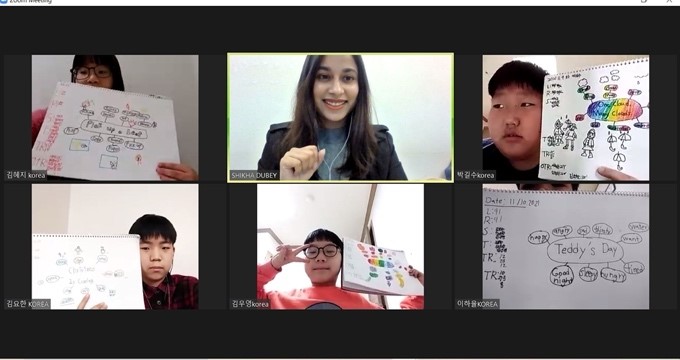KONA Storybook Experiences of 2021
KONA, the Korean Organization of the Natural Approach, is a UNESCO-sponsored initiative to help underprivileged children to learn English through storybooks. Volunteers assist children in orphanages, at community children centers, at day-care centers, and at the KONA Storybook Center in normal times, and online during pandemic times. Here, three of the KONA Volunteers share their experiences and thoughts on contributing their services to KONA throughout the past year. — Ed.
My Year of Volunteering at UNESCO-KONA
By Shilpa Rani
“You can teach a student a lesson for a day; but if you can teach him to learn by creating curiosity, he will continue the learning process as long as he lives.” — Clay P. Bedford
This quote by Bedford encapsulates the goals of the Korean Organization of the Natural Approach’s (KONA) teaching and learning process. I first visited UNESCO-KONA as a speaker at the KONA Vision Talk in 2010. I met the young volunteers in training there, and I saw how much better children learn from each other than from a one-sided lecture from an adult teacher. They were not even aware that teaching was happening, and learning, too. The idea of learning a language through stories and story maps piqued my interest. Every story is turned into a map, which stimulates visual learning.
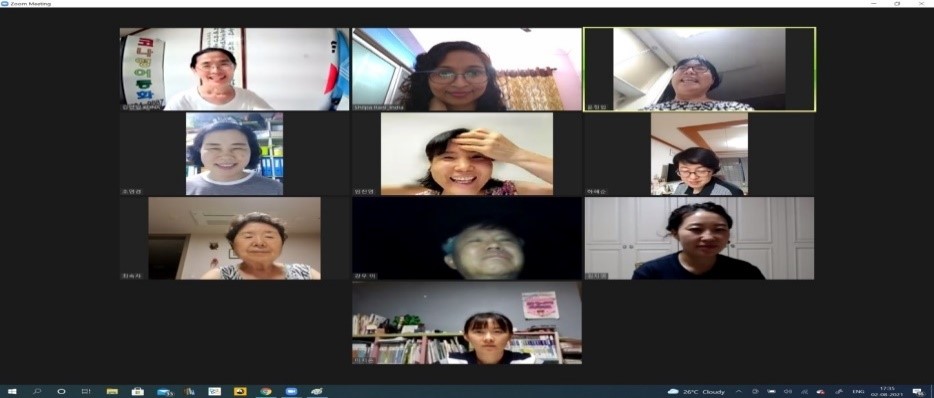
I have been a member of the KONA family since 2014. It has been a process of learning and growth for me. Over the years, I have had the opportunity to participate in weekend cultural exchange programs, buddy reading programs, KONA vision talks, Children’s English Library (CEL) volunteering, storytelling sessions at Gwangju International Community Day, and in the Gwangju World Storybook Festival, in addition to volunteering at the Gwangju Children’s Home twice a month.
After being associated with KONA for several years, I had to return to India. But the COVID-19 pandemic brought us all back together, this time via the internet. Volunteers from Korea (KONA-families), foreign volunteers from India (myself), Canada (Kevan), and other volunteers residing in Korea from Japan (Yoshiko), Bangladesh (Nayan), India (Shikha), Uzbekistan (Mati), and children from the Gwangju Children’s Home in Gwangju all participate in a Zoom call from their respective homes on the day of volunteering. We split into breakout rooms due to the large number of participants and read and learn from one another. I am delighted for the student volunteers because meeting people from various origins and cultures broadens their perspective of the world and alleviates their fear of strangers. They learn to care and love the earth more when they realize that, despite our differences, we are all members of the same large universal family. The pandemic has affected the children socially. Professor Kim Young-im, the founder of KONA Volunteers, was nice enough to permit my son, Adhrit Pradeep, to volunteer as well, and each week he used to prepare a science topic for discussion. He enjoyed connecting with children and sharing his thoughts.
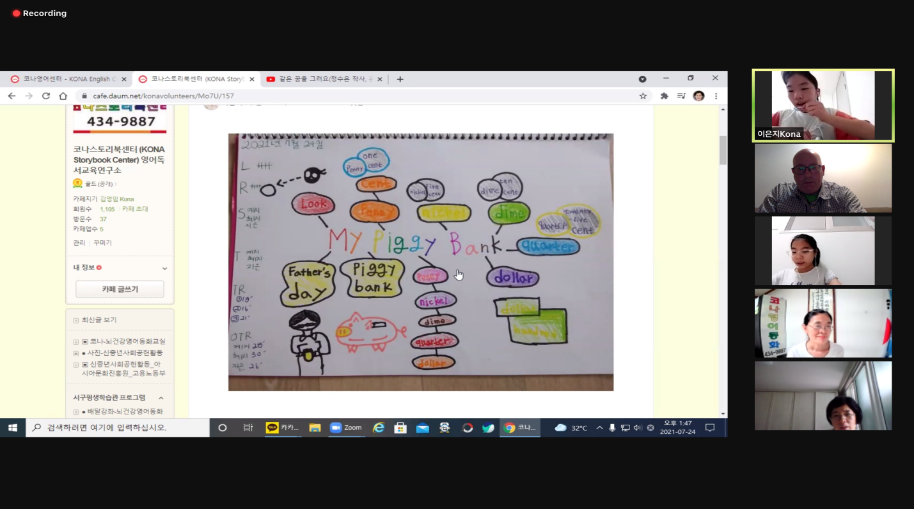
This past year, I have also had the chance to engage with senior citizens who are interested in story mapping as a method of learning. Their eagerness to learn is contagious. Even though I live 5,000 kilometers away, we have been able to connect, communicate, and be a part of the KONA volunteering family, cherishing our time together.
I have discovered that we all have an inherent responsibility to assess our impact on others and, eventually, to care for them. As a result, we must be willing to share what we individually have of value. I believe impressions made as a child leaves lasting imprints in our memories. I hope I can positively influence these memories in children through my volunteering.
We never know how our actions may make an impact on someone’s life!
My Virtual KONA Volunteering Experiences in 2021
By Matkhiya Usmonova
One of the words that defined 2020 and 2021 is “pandemic” – it still literally means “affecting everyone.” The coronavirus has changed all aspects of our lives, and it has led to surprising discoveries. By facing a pending lockdown again in 2021, I dedicated 24 hours of volunteer service to the KONA program. As many already know, the KONA Storybook Center, founded in 2004 by Professor Kim Young-im, is a small research center that supports UNESCO-KONA volunteers. Its specific target is to help disadvantaged children learn English independently through storybooks and story maps. It also motivates families and children to love reading storybooks in English. This year, I also got a chance to give my time and use my skills and passion to make positive changes in disadvantaged students’ lives. In this article, I would like to share my great virtual experiences at the KONA Storybook Center in 2021, which helped me gain confidence by giving me a chance to try something new and build a real sense of achievement.

Since 2020, I have been doing my volunteer work through Zoom, where I can have a great time regardless of why I do it. My volunteering day is every first Saturday of the month from 13:00 to 15:00. During my volunteer time, I see some Korean families and foreign volunteers, including Shilpa Rani and Shikha Dubey from India, who are all very outgoing and love working with children. They always inspire me with their punctuality and abilities in teaching children. Everyone is unique in their own way. My experience with KONA was special and I would love to volunteer there again in 2022.
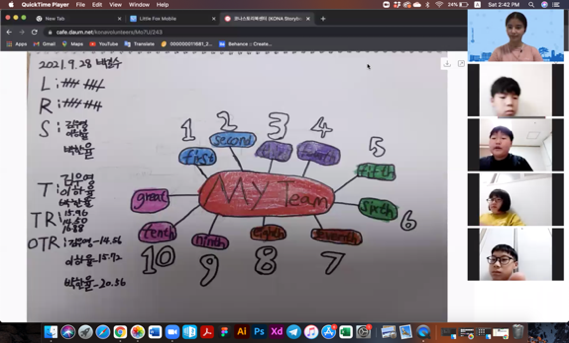
Ten minutes before our volunteer work begins, we join Zoom and discuss what to do with Professor Kim. We also sing inspirational Korean and English songs before starting our work. There will be around 12 students getting prepared to read their storybooks and draw story maps. Our job is to assist them to study English in proper ways as we read short English stories from the websites Little Fox and Unite for Literacy Library. Then the students will read after us, and we check their mistakes related to pronunciation while making a video with Zoom’s recording function. Afterward, we ask some questions related to the stories and make the lesson more informative with in-depth communication. I hope that our work inspires children in learning the English language. This work with students lasts for an hour, and in the remaining hour, the volunteers upload their work in the form of screenshots and recorded videos on both the KONA Storybook and KONA English Center websites. Finally, we put grades like “Okay,” “Excellent,” and “Perfect” on the website for students’ participation.
Disadvantaged children from the KONA English Center spend their precious time studying English online with foreign volunteers, and it is one of their most valuable moments during the period of the COVID-19 pandemic. As for me, I am grateful to Professor Kim for giving me such chances to feel part of something outside my friends as well as family and to learn new skills, gain experience, and sometimes even qualifications. Most importantly, through KONA volunteering, I can challenge myself to try something different, achieve personal goals, practice using my skills, and discover hidden talents.
My Covid-Era UNESCO-KONA Volunteering Experiences
By Shikha Dubey
“There is some good in this world, and it’s worth fighting for.” — J.R.R. Tolkien, The Two Towers
That is right, and I believe that the quote stated above is one of the motives of the founder of KONA, Professor Kim. Moreover, this quote motivates me to endure and compete against many of life’s difficulties. I also believe this is what many frontline coronavirus fighters like doctors, nurses, and many back-end fighters like researchers and Covid-control teams believe in, as they have been striving to battle against this pandemic for more than two years now. None of us could have imagined that in this advanced and highly technological world, we would encounter such a pandemic for such a long time, which not only affects one’s physical health but also the mental health of people around the globe.
We have all faced lockdowns, social distancing, and many other struggles. But even such difficulties have not been able to stop the KONA organization from serving its goal, and its founder kept motivating all of the volunteers, including myself, to teach and help some unprivileged children through our organization. KONA’s goal and vision are to help unprivileged and disadvantaged children by teaching them English through storybooks and story maps, and by making English books and teaching accessible for free worldwide. With this aim, the KONA Storybook Center was established in 2004 by Professor Kim in Gwangju. In this article, I would like to share some of my volunteering experiences at KONA and how they influenced my life throughout this pandemic.

I am a comparatively new member of KONA, as I started volunteering in September 2020, when the COVID-19 situation in Korea was at its peak. I was going through some difficult situations at that time, as I could not visit my family and friends in India due to the pandemic. Then somehow, I got into contact with Professor Kim and decided to dedicate some of my time to some of the noble deeds of KONA. Due to the pandemic, I started online volunteering through Zoom. In the beginning, I joined for two Saturdays a month and observed how my co-volunteers conducted their online lessons. I met my KONA co-volunteers from different countries, such as India, Uzbekistan, Japan, Bangladesh, and Canada, along with young Korean volunteers. I was motivated by noticing how all the volunteers were so dedicated to their work at KONA and how all of them enjoyed teaching the children at Gwangju Children’s Home. I enjoyed all the sessions; the participants were all so well behaved and friendly.
Later, after getting some experience, I started volunteering every second Saturday of the month on Zoom at Gwangju Children’s Home, 13:00–15:00. I, along with Professor Kim and other co-volunteers, joined our Zoom session. We do pre-session prep before the children join us. After some singing, we go to breakout rooms. Pictures are taken of the students with their story maps, after which they tell their stories from the maps. As volunteers we help with grammar and pronunciation problems, give motivating evaluations and upload them to the website.
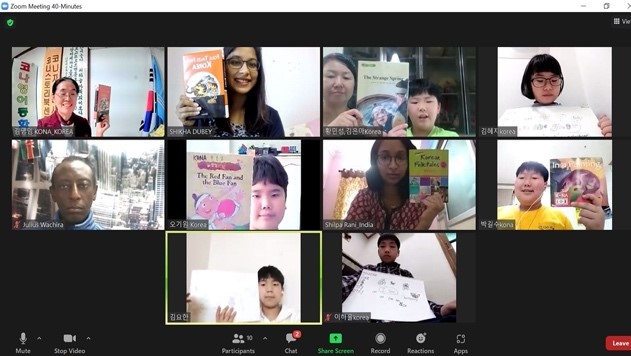
To make the kids’ studies exciting and fun, we sometimes arranged cultural sessions, where we learned about other countries’ cultures. After the session ended, all the volunteers updated Professor Kim with information about the students’ performance and ideas for how to improve our online KONA sessions – that is how we ended our volunteering each day.
All the volunteers together enjoy teaching these kids. I personally found this volunteering so helpful in my life. Although I have not met any children in person because of social distancing, I still enjoy teaching them and learning from them. This helps me keep my sanity and keep my energy high by doing these good deeds. Of course, I would like to meet all the students in person after this pandemic situation gets better. I am so grateful to Professor Kim for giving me this opportunity and allowing me to be a part of such a great organization. Apart from my daily work life, this volunteering has also helped me in learning new skills and has given me such a great experience despite the pandemic. Lastly, I would like to mention that we should never give up in our lives; there is always hope. And that is what I can say after meeting the children from Gwangju Children’s Home.





